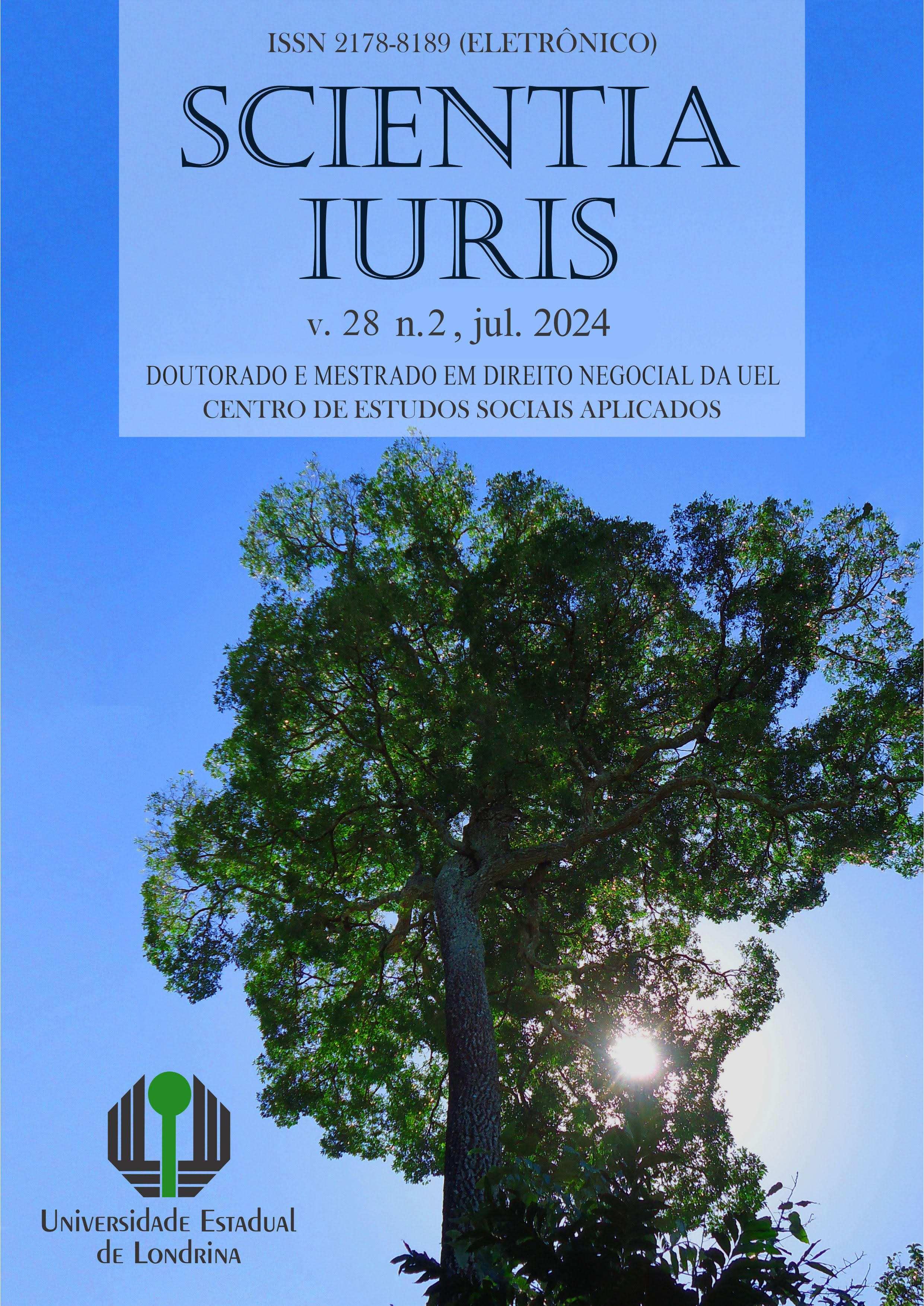Conflict mediation as a contribution to legal professionals in the 21st century: the report the future of jobs and socioemotional skills
Keywords:
Legal training. Socio-emotional skills. Access to justice. Conflict mediation.Abstract
This article seeks to explore how adequate training for lawyers relates to a broader view of conflict mediation, as an essential skill for developing their activities. Modern society is going through major changes, from different perspectives of human coexistence, with conflicts being more evident and, on the other hand, more complex, deserving focus on adequate conflict management. In this way, the future of jobs, based on the technological revolution, requires more appropriate solutions from professionals. It is necessary to relate conflict mediation as a contribution to the legal professional, as a modern instrument with a broad spectrum of action. Bibliographical research was used, of a qualitative nature, using the hypothetical deductive method, with an exploratory nature. In the end, we verify the importance and how the adequate training of legal professionals can be made viable, based on the new challenges posed, rethinking a new format of legal education that takes into account the skills of the professional of the future.
Downloads
References
ANTUNES, Lucedile; SPADOTO, Marcel. Soft Skills-Vol 2: habilidades do futuro para o profissional do agora. Literare Books, 2021.
BARBOSA de Oliveira, Camilla Felix; TORRACA de Brito, Leila Maria. Humanização da Justiça ou judicialização do humano?. Revista Psicologia Clínica (PUC-RJ), vol. 28, núm. 2, Rio de Janeiro, 2016, pp. 149-171.
BAUMAN, Zygmunt. Modernidade líquida. Rio de Janeiro: Zahar, 2001
BAUMAN, Zygmunt. Amor líquido: sobre a fragilidade dos laços humanos. Editora Schwarcz-Companhia das Letras, 2004.
BRASIL. Ministério da Educação. Resolução nº 05, de 17 de dezembro de 2018, que institui as Diretrizes Curriculares Nacionais do curso de Graduação em Direito e dá outras providências. Diário Oficial [da] República Federativa do Brasil, Brasília. 19 dez. Seção 1, p. 47-48, 2018.
CASTELLS, Manuel. A sociedade em rede. 17. ed. São Paulo: Paz e Terra, 2016.
CHARLES, Sébastien; LIPOVETSKY, Gilles. Os tempos hipermodernos. São Paulo: Barcarolla, 2004.
DAMASIO, ANTONIO. O Mistério da consciência: do corpo e das emoções ao conhecimento de si. 2ª edição, São Paulo: Companhia das letras, 2015.
FALECK, Diego. Manual de design de sistemas de disputas: criação de estratégias e processos eficazes para tratar conflitos. Editora Lumen Juris, 2018.
FISHER, ROGER; URY, WILLIAM; PATTON, BRUCE. Como chegar ao sim: como negociar acordos sem fazer concessões. 1ª edição. Rio de Janeiro: Solomon, 2014.
FISHER, Roger; SHAPIRO, Daniel. Além da razão. Rio de Janeiro: Alta Books, 2019.
GARAPON, Antoine. O juiz e a democracia: o guardião das promessas. Rio de Janeiro: Revan, 1999.
GARDNER, Howard. Inteligências múltiplas: a teoria na prática. Porto Alegre: Artmed, 1995.
GORETTI, Ricardo. Mediação e acesso à justiça. 2. ed. Salvador: Editora Juspodivm, 2021.
HARARI, Yuval Noah. 21 Lições para o Século 21. Editora Companhia das Letras, 2018.
KAHANE, Adam. Como resolver problemas complexos. Senac, 2008.
MEDINA, José Miguel Garcia; DOS PASSOS MARTINS, João Paulo Nery. A era da inteligência artificial: as máquinas poderão tomar decisões judiciais?. Revista dos Tribunais. vol, v. 1020, n. 2020, p. 311-338, 2020.
MEIRA, Luciano Alves. Introdução. In: Soft skills: competências essenciais para os novos tempos. Coordenação: Lucedile Antunes. - São Paulo: Literare Books International, 2020
OAB. Ordem dos Advogados do Brasil. disponível em: <https://www.oab.org.br/>. Acesso em 27 mai. 2023.
ROCHA, Leonel Severo. KREPSKY, Giselle Marie. Revista Quaestio Iuris. O direito, a ciência e a educação: Relações intersistêmicas. vol. 11, nº. 01, Rio de Janeiro, 2018. pp. 129-153
ROSENBERG, Marshall B. Comunicação não-violenta: técnicas para aprimorar relacionamentos pessoais e profissionais. São Paulo: Ágora, 2006.
SILVA, Lucas Gonçalves da; VITALE, Carla Maria Franco Lameira; SILVA, Luciana Aboim Machado Gonçalves. A solução consensual de conflitos e a atual visão do operador do direito: novos desafios do ensino jurídico com reflexos para uma sociedade mais justa. Revista Prisma Jurídico (UniNove), vol. 15, núm. 1, pp. 203-227, 2016.
SCHWAB, Klaus. A Quarta Revolução Industrial. Tradução: Daniel Moreira Miranda. São Paulo: Edipro, 2019. Edição do Kindle.
SINEK, Simon. Comece pelo porquê. Rio de Janeiro: Sextante 2018.
SUSSKIND, Richard E. Tomorrow's lawyers: an introduction to your future. Oxford University Press, 2017.
TARTUCE, Fernanda. Advocacia e meios consensuais: novas visões, novos ganhos. In: João José Custódio da Silveira; José Roberto Neves Amorim. (Org.). A nova ordem das soluções alternativas de conflitos e o Conselho Nacional de Justiça. 1ª edição. Brasília: Gazeta Jurídica, 2013, v. 1, p. 125-146.
TOMAZ, Patrícia Rodrigues. A Análise do Discurso jurídico na mediação envolvendo sujeitos em conflitos. Revista Ininga. Teresina-PI, v. 2, n. 1, p. 99-111, jan./jun. 2015.
TURING, Alan M. Computing machinery and intelligence. In: Parsing the turing test. Springer, Dordrecht, 2009. p. 23-65.
WORLD ECONOMIC FORUM. The Future of Jobs Report 2023. Disponível em: https://www.weforum.org/publications/the-future-of-jobs-report-2023/. Acesso: 27 mai. 2023.
ZIMIANI, Doroteu Trentini; HOEPPNER, Marcio Grama. Interdisciplinaridade no ensino do direito. Revista Akrópolis Umuarama, v. 16, n. 2, p. 103-107, abr./jun. 2008
Downloads
Published
How to Cite
Issue
Section
License
Copyright (c) 2024 Marcella Mourão de Brito, Mara Livia Soares Damasceno, João Renato Banhos Cordeiro

This work is licensed under a Creative Commons Attribution 4.0 International License.
The journal reserves the right to modify, in the original text of the submitted article, normative, spelling and grammatical mistakes in order to maintain the cultured standard of language and the credibility of the journal. The journal will respect the authors' writing style. Changes, corrections or suggestions of conceptual order will be sent to the authors, when necessary. In such cases, the articles will be re-examined. The final exams will not be sent to the authors. The published works become the property of the journal, in other words, its total or partial reprinting is subject to the express authorization of the journal. In all subsequent citations, the original source of publication shall be cited and in the case of Photographic Speeches, shall be approved by the original author. The opinions expressed by the authors of the journal's articles are of their sole responsibility.













